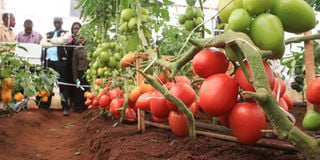For bumper harvest, get it right with seeds

Farmers learn new ways of growing tomatoes in a green house at Continental Seeds’ stand during a past farmers’ training day at Wambugu Agricultural Training Centre in Nyeri. Farmers were advised to plant the right seeds and use new farming technologies to maximise their yields. PHOTO | JOSEPH KANYI | NATION MEDIA GROUP
What you need to know:
- Kenya’s seed industry is divided into the formal and informal sectors.
- Seeds, directly or indirectly, have an effect on increased agricultural productivity, improvement on food security, lowering money spent on food purchases and imports, and raising domestic economic activity.
- Poor germination, high concentration of impurities and low farm yields are some of the consequences farmers using fake seeds have to contend with.
- Stay safe for better harvest, do not buy uncertified seeds that will cause you pain.
If you get it wrong during planting, you will not have it right at harvesting.
Seeds represent the beginning of life of a plant, therefore, quality seeds, mean a bumper harvest.
It is consequently important that you as the farmer get good quality, certified seeds from trusted suppliers if you are to profit from your venture.
Kenya’s seed industry is divided into the formal and informal sectors.
The formal sector focuses on breeding, producing and selling seeds certified by the regulator, Kenya Plant Health Inspectorate Service (Kephis) in accordance with the Seeds and Plant Varieties Act (CAP 326).
The informal seed sector, on the other hand, produces seeds that farmers save and recycle on their farms, mainly from previous harvests. Therefore, they are not certified by Kephis.
The formal seed sector is made up of both public and private institutions. Among the public, we have the Kenya Agricultural and Livestock Research Organisation’s (Kalro) Seed Unit, public universities like Egerton University, University of Nairobi and Maseno University, the Agricultural Development Corporation and parastatals like the Kenya Seed Company.
Private sector seeds providers constitute a larger part of the nation’s seed producers, with nearly 20 established and upcoming companies carrying out their operations across the country.
Prof Paul Kimurto, a crop science expert and Egerton University Seed Unit Co-ordinator, notes that there is no shortcut to good harvest and food security.
SEEDS SPECIFIC FOR DIFFERENT CLIMATIC CONDITIONS
“Seeds, directly or indirectly, have an effect on increased agricultural productivity, improvement on food security, lowering money spent on food purchases and imports, and raising domestic economic activity.”Good seeds, according to him, should be produced to quality standards by incorporating specific genetic compositions and requirements.
Such seeds are generally acceptable as being of a variety that is pure, are fast and strong during germination, are free from diseases, especially those transmitted through seed pests and they also do not contain other debris within their packages.
Good seeds should also be specific for different regions because each zone has its own climate and soils, besides other agro-ecological requirements.
However, he notes that unscrupulous traders have taken advantage of the improved production, supply and distribution of seeds across the country to sell cheap, fake seeds that are causing farmers great agony.
Poor germination, high concentration of impurities and low farm yields are some of the consequences farmers using fake seeds have to contend with.
Farmers are, therefore, advised to avoid fake seeds and ensure those that they buy are certified. Certified seeds have a mark of quality from the Kenya Bureau of Standards.
Besides, companies have come up with several ways to enable farmers verify if seeds are genuine, the most popular method is by sending a text message to a given four-digit code.
Stay safe for better harvest, do not buy uncertified seeds that will cause you pain.





